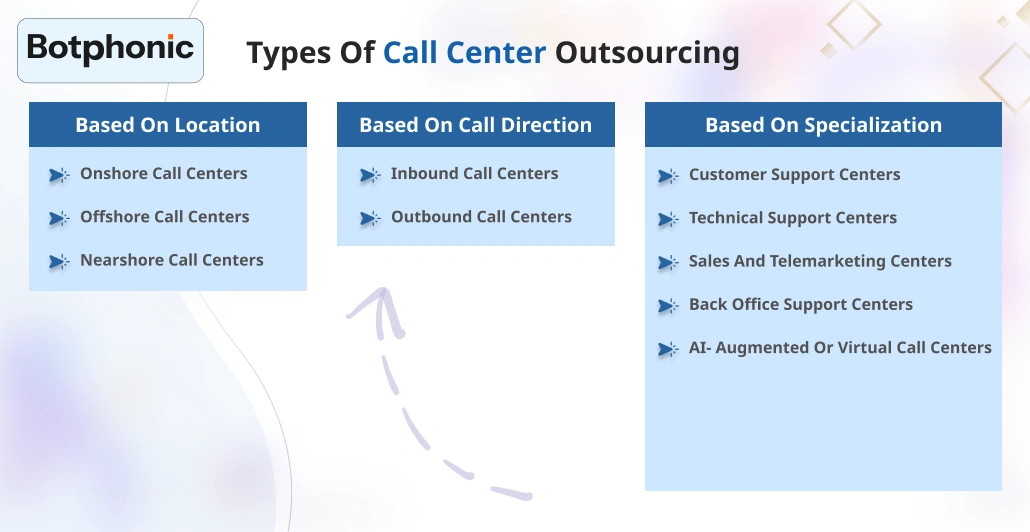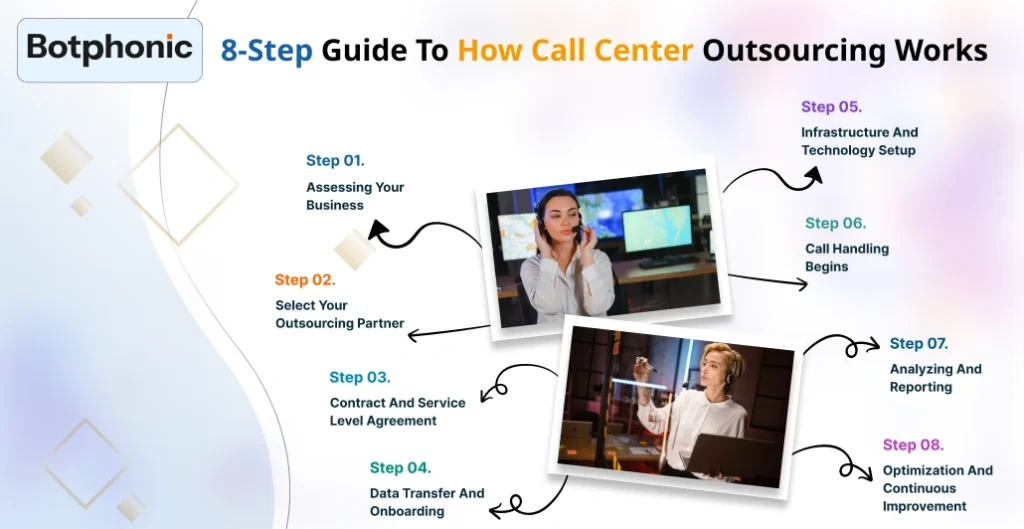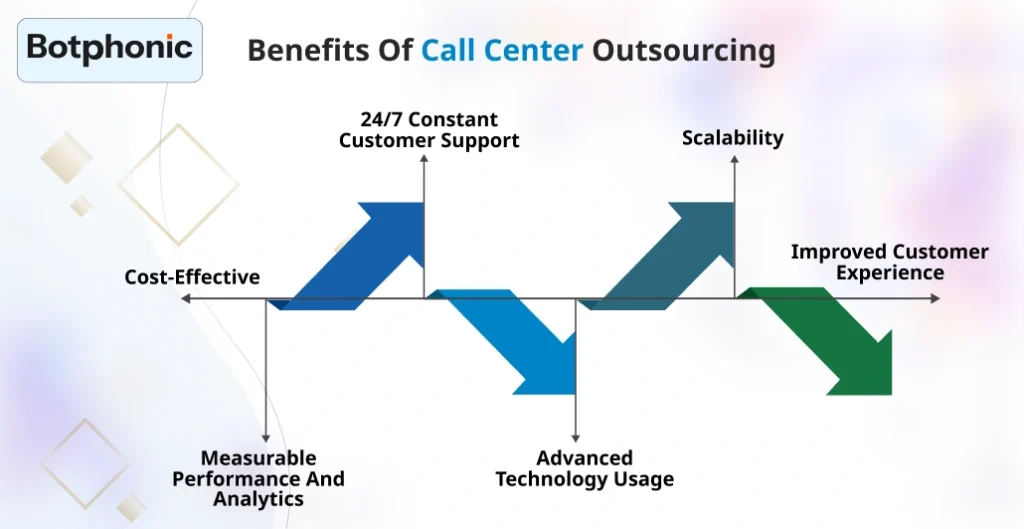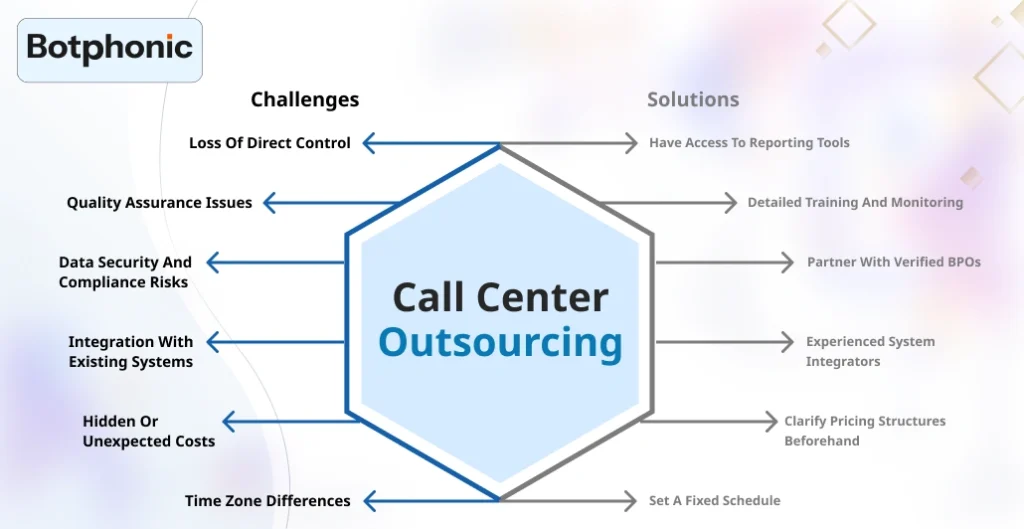
Summarize Content With:
Quick Summary
Call center outsourcing refers to hiring a third company to handle the business’s consumer interactions. In this blog, we are going to know what call center outsourcing really is, how it’s implemented, and most importantly, why it’s important.
Introduction
Call center outsourcing is a world full of opportunity and creativity. It delegates businesses to stay fierce and consumer-focused even without overwhelming their own teams. With the tailored strategy in place, you can benefit from call center outsourcing like no one else. Let’s see what it is and how it works.
What is Call Center Outsourcing?
Call center outsourcing is the ethical and business practice of hiring a third-party company which is usually a business process outsourcing provider. It helps handle customer support, sales, or communication services on behalf of the company who connected.
Instead of hiring a full in-house team of call centers, companies opt for outsourcing these operations to external teams.
Types of Call Center Outsourcing

Outsourced call centers have several types based on their specialization, location, and even function. Let’s understand these types and how they help any particular business.
Based on Location
1. Onshore Call Centers
- These call centers are usually located in the same country as the business.
- The agents hired for the team usually speak the same language and dialect and understand the local language.
- These kinds of outsourced customer services are best for high-quality customer experience and regulated industries.
2. Offshore Call Centers
- These are usually located in different or often in lower-cost countries, such as India, the Philippines, and many more.
- It offers cost savings due to lower labor rates and efficient working.
- These kinds of telemarketing outsourcing companies are best for cost-driven support and large-scale operations.
3. Nearshore Call Centers
- These outsourcing telemarketing companies are often located in close countries, it might be even in the comparable time zone to the company.
- It offers a balance between cost-efficiency and cultural alignment.
- These types of businesses can be suitable for regional support and bilingual services.
Based on Call Direction
1. Inbound Call Centers
- Inbound calls are phone calls initiated by customers to the business; they might be for customer support, complaints, or common queries.
- During inbound calls, the outsourced inbound call center’s task is mainly to resolve the occurring issues and retain customers.
2. Outbound Call Centers
- Outbound calls are those usually made by businesses to customers or potential leads.
- By using customer support BPO, teams’ main task involves customer lead generation, surveys, collections, and others, they help generate sales and even help gather information.
Based on Specialization
1. Customer Support Centers
- Outsourced customer care services usually focus on resolving issues, handling complaints, and helping with general service inquiries.
- Their key channel involves phone, email, or chat.
2. Technical Support Centers
- These types of support centers usually specialize in solving product-related queries or sometimes software or hardware issues.
- It might require trained and certified agents to complete the demos efficiently.
3. Sales and Telemarketing Centers
- With outsourced call center services, these types of calls are focused on cold calling, upselling, and even lead generation.
- It may use AI voice agents or even trained bots with scripts for consistency.
4. Back Office Support Centers
- By incorporating outsourced contact center services, these companies usually handle non-voice tasks, for instance, data entry, bill processing, or sharing order details.
- It might sometimes be combined with voice services for providing full-service outsourcing.
5. AI- Augmented or Virtual Call Centers
- With outsourced customer service solutions and AI call assistants, sometimes companies use AI virtual assistants, chatbots, and even automation tools to assist or replace existing agents.
- These help improve efficiency, provide support 24/7, and even lower costs.
8-Step Guide to How Call Center Outsourcing Works

Now that we know what call center outsourcing is, let’s know more about it in detail and how it works.
Here’s a step-by-step breakdown of how the process typically works:
1. Assessing Your Business
The first step is always to understand what your business or organization really needs to outsource, is it:
- Customer support?
- Technical support?
- Inbound sales?
Or it can be anything as per your requirement. By assessing your business will help you define the scope, and budget, and you will have your pre-defined goal to achieve.
2. Select Your Outsourcing Partner
After assessing your own business and having a pre-defined goal, choose your outsource customer service partner based on:
- Experience and reputation of the same
- Industry specialization, for instance, healthcare, finance, e-commerce
- Language capability and their time zone alignment.
3. Contract and Service Level Agreement
You should make a contract or a service level agreement which will state the conditions mentioned by you and the outsourcing telemarketing company which will do your work. It should include these components briefly in it:
- Scope of service
- Operating hours i.e, is it 24/7 or business hours
- Performance metrics, such as first-call resolution and others
- Escalation Process
- Data protection clauses
4. Data Transfer and Onboarding
Your internal team needs to share:
- Product or service training
- Company policies and scripts
- CRM access and FAQs from your consumers
- Brand tone and guidelines, which strictly need to be followed
The outsourcing partner then trains their agents to ensure a transitional and effortless handoff.
5. Infrastructure and Technology Setup
Outsourced customer support services teams have to set up a few key components to ensure real-time collaboration between your team and the vendor. For instance;
- Telephony and call-routing systems.
- CRM and ticketing tools
- Call recordings and monitoring systems
- AI tools, such as virtual agents, voice recognition, etc.
Cloud-based or server systems also offer these features.
6. Call Handling Begins
After getting ready from the internal team of the organization, the outsourced call center starts managing the live calls, which may also include:
- Inbound calls
- Outbound calls
- Multichannel support
7. Analyzing and Reporting
Tracking the ongoing processes of outsourcing company includes:
- Daily/ weekly/ monthly call reports
- Quality assurance evaluations
- Customer Satisfaction metrics
- Real-time dashboards and analytics
Many corporations hold regular review meetings to assess KPIs and adjust the procedures if there’s any need.
8. Optimization and Continuous Improvement
A reliable and trustworthy company doesn’t just follow the steps blindly but they also,
- Suggest process improvements
- Use analytics and feedback to train their live agents
- Execute AI and automation tools to increase productivity
- The scale required operations during peak times
Call center outsourcing solutions don’t just work as a company but as a partner who helps provide the proper execution of an organization’s vision.
Benefits of Call Center Outsourcing

1. Cost-Effective
By optimizing BPO call center service helps eliminate the need to invest in:
- Office space
- Equipment such as phones, servers, and software
- Recruitment and training of agents
Businesses save significantly on operational and labor costs especially while having offshore or nearshore services.
2. 24/7 Constant Customer Support
Many custom support BPO provides round-the-clock availability, including weekends and holidays. It enables businesses to serve at a global level and in different time zones without affecting business and its potential employees.
3. Scalability
Outsourcing companies can easily scale multi-directionally based on:
- Seasonal demand
- Business growth
- Specific campaigns
It helps reduce the risk of overstaffing or even understaffing.
4. Improved Customer Experience
Outsourced services often offer an intensified customer experience by providing:
- Fast response times
- Trained agents
- Advanced call-handling tools, such as IVR, AI bots, etc.
5. Advanced Technology Usage
Top customer service outsourcing companies use advanced technology tools to optimize efficiency. They also support multichannel and provide multilingual support with tools such as;
- AI call assistants
- CRM integrations
- Predictive dialers
- Real-time analytics
- Chat
- Social media
Organizations benefit from enterprise-level tech without having to make high upfront investment and expand their global outreach too.
6. Measurable Performance and Analytics
Many call center solutions track the essential KPIs like;
- Average Handling Time(AHT)
- First Call Resolution(FCR)
- Customer Satisfaction(CSAT)
It helps to provide ease of access for analyzing and improving the service quality with data-backed insights.
Why Is It Important?
Call center outsourcing plays a strategic role and helps in growing business exponentially while competing with other relevant competitors without any foul play.
The key reasons why it is important are as follows:
- Reduces operational costs
- Ensures constant support
- Enhanced satisfaction
- Enables human agents to focus on complicated tasks
- Offers flexibility while ensuring scalability
- Delivers measurable results
This is important because it helps businesses to operate more efficiently compared to following manual workflows, and serves customers in a much better and faster way. It can also expand globally without creating any bigger changes in infrastructure or budget costs.
Challenges Of Implementing Call Center Outsourcing
1. Loss of Direct Control
- When you opt to outsource your call center, you are losing some of the controls and privileges over your daily operations.
- To maintain consistency with brand voice and customer treatment becomes a little tricky.
2. Quality Assurance Issues
- External agents who might be working on your project might not understand your point of view or even the proper use of your product or service.
- There might be chances of inconsistent service quality if training is not properly done.
3. Data Security and Compliance Risks
- Outsourcing majorly involves sharing sensitive data with other parties which might include customer confidential shares.
- It increases the chances of data breaches and even non-compliance with regulations like GDPR or HIPAA.
4. Integration with Existing Systems
- Integrating outsourced call center tools with existing CRM, ticketing systems and analytics can be a difficult task and might create tricky situations.
- If the integration is not done perfectly, it might affect workflow and reporting.
5. Hidden or Unexpected Costs
- While signing the contracts there might be some hidden fees included for reporting, overtime, or even the technology upgrades.
- There might be times when misaligned expectations can cause some financial and moral frictions.
6. Time Zone Differences
- Although few companies offer time zone shifts, which might be beneficial for 24/7 support.
- It can also delay communication and decision-making between your vendor and team.

Solutions To Fight Potential Risks:
Even though there are challenges, don’t worry just as challenges exist as solutions too.
To fight these challenges effectively you can always find solutions such as;
1. Have Access to Reporting Tools
- To have access to all the data and decision-making, schedule regular audits, clear SLAs, and have real-time reporting tools.
2. Detailed Training and Monitoring
- Have regular training sessions for the agents, and use call monitoring effectively to ensure smooth operations are done. Perform regular quality checks to know the real stats.
3. Partner with Verified BPOs
- To avoid data breaches and security threats partner only with certified and verified companies who provide strong data protection policies and legal compliance.
4. Experienced System Integrators
- To avoid the issue of complying and connecting with existing CRMs, select vendors who have proven experience in integrating systems and shared dashboards.
5. Clarify Pricing Structures Beforehand
- By having a clear picture of the pricing structure and conditions that need to be added to the contract you can avoid hidden costs.
6. Set a Fixed Schedule
- To avoid time zone difference issues, set fixed sync-up times and use collaboration tools effectively for async updates.
Conclusion
Outsourcing your call center will always help you in more than one way. It’s not just a burden off of your employees but a wise decision and an effective strategy that moves toward scalability, global reach, and enhanced rate of customer satisfaction. By handling customer inquiries 24/7 and multilingual support, it becomes the proper extension of your brand.
For companies looking to grow even while maintaining their top-tier customer care, it’s not just an option but has become a necessity.

